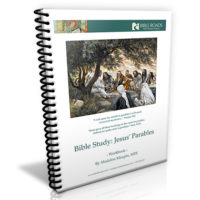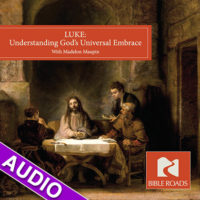I remember reading about Jesus’ parables and laughing as a minister confessed, when asked if he would ever write a book on them, that the pastor would when he finally understood “The Shrewd Steward” (see Luke 16:1-13). By that time he had only been preaching about 50 years.
I share that because if you’ve ever scratched your head over one of the most enigmatic of the Gospels two-dozen or so parables, it’s at least comforting to know you have good company. So how to tackle it?
With prayer and with others. A group of about 65 friends and I recently spent four days going through Jesus’ parables in depth and filmed our discussions. (That’s now available through Bible Roads as an online course for Bible Study groups, for those who want to join in the discussion and have their own as well.) Stories we’ve known well are sometimes the best for going deeper, especially in a rich exchange with others who love them as well.
One of the discoveries made is that looking at the parables in the order they’re presented (whether in Matthew or Luke where most occur), helps lay the groundwork for each subsequent one, as they can build on each other, or at least have related themes. For example in Matthew’s gospel, the parables reflect on aspects of the Kingdom of Heaven, whereas in Luke many focus on how we care for our neighbor.
The ‘dishonest manager’, as the parable is sometimes called, has similar components to other Gospel stories–a wealthy owner, a servant and a vineyard—but there the similarities end. While the story is part of Luke’s larger theme about the dangers of wealth, the tale twists and turns so that we’re not quite sure where it’s going or what is its main point.
Unpacking it, we recall that Luke often highlights the dangers of wealth to spiritual maturity, and this parable is part of several that address this. The steward, a slave really, is in charge of his absentee master’s vineyard, and we think this story might be reminiscent of Jonah, teaching us by negative example. After all, the steward wasn’t living up to his master’s expectations for the job and is fired. As the shrewd steward realizes he is ill equipped for hard labor or for begging, the manager schemes to get money from those who owe his master.
Going to his master’s creditors, the steward renegotiates their debt downward, making them obligated more to him now, than the master. The master gets what he is owed, but minus the commission the steward would have earned. Just when we think we understand that this is a simple story not to cheat others, the master praises the steward! What?
The Master/owner praises his steward for quick thinking and actions, perhaps revealing a bit of the same roguish element in the master. This is when the sometimes-scrappy Message translation, with its idiomatic phrasing, can be helpful. Luke writes:
Now here’s a surprise: The master praised the crooked manager! And why? Because he knew how to look after himself. Streetwise people are smarter in this regard than law-abiding citizens. They are on constant alert, looking for angles, surviving by their wits. I want you to be smart in the same way—but for what is right—using every adversity to stimulate you to creative survival, to concentrate your attention on the bare essentials, so you’ll live, really live, and not complacently just get by on good behavior” (Luke 16:8,9).
Luke has several other points he makes to lend insight into the text, but if we stated the rest here you wouldn’t have any fun in your own discoveries. Enjoy digging into one more of Jesus’ profoundly rich and timeless parables—hopefully with friends.
Dig into the Parables like The Shrewd Steward more through the BibleRoads Online video course: “Jesus Parables”.





This parable, in a way, reminds me of Mary Baker Eddy dealing with a man who was acting as a go-between in the purchase of some land. The man kept telling Eddy that the old barn on the land was more valuable than it was and thus the price of the land was going up. It was just a shack. So she told him that if he would get the seller to sell it to her for a good price she would give him a valuable gift. He eagerly complied and when the transaction was completed – she gave him… Read more »
Such a difficult parable at first glance. Thanks for unpacking it for us. The Shrewd Steward seems to honor a dishonest manager for his shrewed tactics. . . survival tactics. I think Jesus is telling us to be alert and creative in dealing with people . . .don’t be complacent. really live!! It reminds me of a recent blog I read by Don Ingwerson who was being interviewed by a somewhat skepical yet very charming broadcaster, Cash Peters. Don was most alert and his answers to some very tricky questions were poised, humorous, creative and healing. You might enjoy listening… Read more »
Spiritual integrity is primary to, but does not preclude human help. The steward was going to be let go for mismanagement so he still had some leverage to conduct business with the rich man’s debtors and was thus able to collect his money without taking his own commission. The rich man, being less than honest himself, of course saw this as shrewdness. But who is Jesus talking to here? And what is he trying to convey? I believe he was pointing to a just stewardship…to the principle of righteous behavior toward your neighbor, using wealth to the benefit of all,… Read more »
A tricky parable! Evelyn’s example from Mary Baker Eddy’s life is just perfect. I have always read this parable somewhat differently from Madelon’s explanation. When creditors can’t pay in full, it is sometimes a help to ask them to pay a portion. It takes away the fear and shame of being in debt. So, to pay a portion helps them to clear their debt while also helping the supplier to get the money that is rightfully theirs for goods supplied or services rendered. I never imagined that the steward received anything out of the transactions…maybe I am missing something in… Read more »
[…] http://bibleroads.wpengine.com/the-shrewd-steward-puzzler-of-a-parable/ […]
Julie,
Thank you for such a thoughtful response to the Steward parable. I love how your reading of it has grown directly out of your life and running your own business. This is part of why the Parables are invaluable and timeless — they speak to each of us through the lens of our own life experience and prayers. So appreciate you sharing yours. Madelon
perfect money to bitcoin – sell bitcoins instantly, sell bitcoin instantly